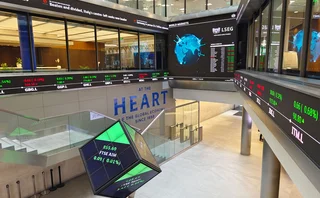
Risk solutions house of the year: SG CIB
Risk Awards 2017: From African nations to Italian corporates, XVAs are an awkward new obstacle

As traders, quants and academics work out how to include a host of new or ignored costs into derivatives prices, end-users are running into walls that did not exist a few years ago – counterparty risk, capital, funding and margin charges. These pricing adjustments, known collectively as XVAs, can sometimes look like arcane concerns. In fact, they affect the ability to finance, hedge and invest.
Take the example of the Republic of Cameroon, which planned an inaugural US dollar bond issue in late 2015. The fast-growing nation of 22 million people has seen widening inequality in recent years, so drew up a three-year emergency plan to improve conditions for the poorer sections of society – building houses, hospitals and drilling 100 wells in each of its 10 regions, supporting farming and fishery, improving the country's roads and trying to make the power grid more reliable.
Dollar issuance would allow the country greater access to US investors but, because Cameroon's currency is pegged to the euro, it wanted to manage currency risk by swapping the dollar debt into euros.
The challenge was finding dealers willing to face a B-rated counterparty for nine years on a large, uncollateralised swap – a transaction that would have generated heavy capital requirements via the Basel framework's charge for counterparty risk and its separate charge for future credit risk, known as credit valuation adjustment (CVA).
Societe Generale Corporate & Investment Banking (SG CIB) had encountered this problem a year earlier, with another west African issuer, the Republic of Senegal. In the earlier case, the problem had been solved by adapting a loan insurance product from an arm of the World Bank, to cover a portion of the CVA exposure and cut the cost of the cross-currency swaps by 50 basis points.
Societe Generale's teams were always responsive and constructive, which helped in striking a compromise in the structure of the guarantee to match Cameroon's constraints
Alamine Ousmane Mey, minister of finance for Cameroon
That experience helped SG CIB land the role of co-ordinator for the Cameroon hedge, but the trade came with an added demand. In the event of a derivatives default, the country's finance ministry did not want to be forced to unwind the trade straight away, leaving itself unhedged and potentially needing to restructure the debt – it wanted some breathing space.
The solution was to obtain a guarantee from the African Development Bank (ADB), in which the ADB would meet Cameroon's payment obligations for a period of two years after the point of default.
"If Cameroon cannot honour their payments, the ADB will step in and provide a kind of cure period before any unwinding of the swap. That is key for this type of sovereign issuer because they want the ability and time to restructure their debt," says Antoine Broquereau, global head of financial engineering at SG CIB.
SG CIB ultimately executed a $350 million cross-currency swap, before syndicating to three other dealers. The French bank retained the largest share of the deal.
"Societe Generale played a crucial part in the transaction, thus gaining the role of anchor bank for the hedge. Its teams were always responsive and constructive, which helped in striking a compromise in the structure of the guarantee to match Cameroon's constraints," says Alamine Ousmane Mey, minister of finance for Cameroon.
More deals
Other, similar deals are now in the pipeline, says Albert Loo, the bank's global head of sales for fixed income, currencies and cross-asset solutions: "Because we have all these connections, we are able to do not one or two trades, but more: when you have institutions like ADB in the loop, people are very comfortable to do the next one."
A second deal revolved around funding valuation adjustment (FVA) – a newer addition to the XVA family, which reflects the costs a dealer can incur when offsetting trades have different collateral agreements. In the simplest example, a dealer would not receive collateral when in-the-money on an uncollateralised client trade, but would need to post collateral in an offsetting trade executed with a dealer.

A comment I have heard from clients is that we are the only bank to have these kinds of approaches and they find it very useful
Antoine Jacquemin, SG CIB
FVA is often priced into trades at inception – one possible source of friction between dealer and client – but an increasingly common bone of contention is the FVA charge levied when a client seeks to unwind positions. As an example, that could happen if an uncollateralised client was in-the-money, meaning the dealer did not have to post, and was at the same time receiving collateral on offsetting, collateralised hedges.
One European energy company found itself in exactly this predicament in the second quarter of 2016. A group of euro-denominated, receive-fixed interest rate swaps were in-the-money to the tune of around €250 million, but FVA unwind charges from its four bank counterparties would have wiped millions from the company's gains.
SG CIB was the only one of the four to suggest a solution: the French bank took on the swaps from the other banks, and the client then placed a deposit with the French bank, matching the net funding gain from the swaps. With the funding protected, SG CIB was able to quote a better unwind cost to the client.
"Societe Generale has been the only bank able to provide us with an innovative solution to unwind our interest rate portfolio without incurring any funding cost," says a source at the client.
Antoine Jacquemin, global head of the market risk advisory group at SG CIB, says the transaction is typical of the bank's work: "A comment I have heard from clients is that we are the only bank to have these kinds of approaches and they find it very useful. Our motto is to refer advisory and solutions to clients who actually need it."
In a third XVA-related transaction, SG CIB stepped in to help a large European bank that needed to cut its CVA exposure to French rail operator, Réseau ferré de France (RFF), which was folded back into erstwhile parent, the state-owned SNCF, at the start of 2015. The European bank had hit CVA limits on its exposure to the company and needed to free up capacity.
SG CIB was willing to take on €80 million of 12-year exposure to the company, but only because it believed it would be able to recycle the risk in the form of a credit-linked note. The French bank initially novated the trades and executed a short-term hedge – in the meantime, it looked for an investor that might be enthusiastic about getting synthetic exposure to French sovereign risk, with a pick-up.
"Obviously when we took the position it was long and we didn't want to keep this in our book. We had ideas, and one we were looking at was around structuring the exposure and the spread we could pay to investors," says Broquereau.
He continues: "We knew where the bondholders were because we have participated in some of the RFF placements in the past. So we knew where there could be appetite in the market."
SG CIB assumed the risk in December 2015, but was able to remove the exposure from its books by February 2016.
The vehicle was a 12-year credit-linked note, in which a French insurer sold protection to SG CIB via bespoke credit default swaps (CDSs) – there is no market in RFF single-name CDSs – and French inflation-linked bonds were used as collateral.
The risk we take has to fit with our risk appetite: we look for the different possibilities and take into account all the different investors, so we can build a solution for everyone
Albert Loo, SG CIB
From the insurer's point of view, it was getting an investment that yielded 30 basis points more than comparable RFF bonds, while attracting the same Solvency II capital charge as the physical debt.
The elegant recycling involved in this solution is one reason SG CIB has been successful as a solutions group over the past year: dealers now have to be far more selective about the risks they warehouse, and wherever possible the key skill is to find a new home for that exposure, using a variety of product types.
"Given the constraints, we need to be quick in the way we are recycling the risk. The risk we take has to fit with our risk appetite: we look for the different possibilities and take into account all the different investors, so we can build a solution for everyone," says Loo.
Last year's solutions were not just focused on XVA. Among other deals, SG CIB also created a tailored forward for Norilsk Nickel, allowing the Russian mining company to raise working capital at a fixed price today while choosing to deliver one of four precious metals tomorrow – an unusual degree of flexibility.
SG CIB also played a role in this year's corporate deal of the year. The bank executed the spot foreign exchange transaction for the syndicate of banks involved in a mammoth €6.3 billion deal-contingent foreign exchange forward during Air Liquide's acquisition of US chemicals company Airgas – believed to be one of the largest deal-contingent forex trades ever. The spot trade was needed to hedge the euro/dollar delta of the deal-contingent forwards.
"To price the deal contingent, the banks had to take into account the option market, so they could factor their hedge into their pricing. All banks have a different way of hedging these positions," says Jacquemin.
He continues: "So we co-ordinated with all the banks and offered to Air Liquide a simple way to benchmark all contingent pricings. we agreed with every bank on a single execution process and this left room for Air Liquide to have competition on pricing between banks."
Only users who have a paid subscription or are part of a corporate subscription are able to print or copy content.
To access these options, along with all other subscription benefits, please contact info@risk.net or view our subscription options here: http://subscriptions.risk.net/subscribe
You are currently unable to print this content. Please contact info@risk.net to find out more.
You are currently unable to copy this content. Please contact info@risk.net to find out more.
Copyright Infopro Digital Limited. All rights reserved.
As outlined in our terms and conditions, https://www.infopro-digital.com/terms-and-conditions/subscriptions/ (point 2.4), printing is limited to a single copy.
If you would like to purchase additional rights please email info@risk.net
Copyright Infopro Digital Limited. All rights reserved.
You may share this content using our article tools. As outlined in our terms and conditions, https://www.infopro-digital.com/terms-and-conditions/subscriptions/ (clause 2.4), an Authorised User may only make one copy of the materials for their own personal use. You must also comply with the restrictions in clause 2.5.
If you would like to purchase additional rights please email info@risk.net
More on Awards
Clearing house of the year: LCH
Risk Awards 2025: LCH outshines rivals in its commitment to innovation and co-operation with clearing members
Best use of machine learning/AI: CompatibL
CompatibL’s groundbreaking use of LLMs for automated trade entry earned the Best use of machine learning/AI award at the 2025 Risk Markets Technology Awards, redefining speed and reliability in what-if analytics
Markets Technology Awards 2025 winners’ review
Vendors jockeying for position in this year’s MTAs, as banks and regulators take aim at counterparty blind spots
Equity derivatives house of the year: Bank of America
Risk Awards 2025: Bank gains plaudits – and profits – with enhanced product range, including new variants of short-vol structures and equity dispersion
Law firm of the year: Linklaters
Risk Awards 2025: Law firm’s work helped buttress markets for credit derivatives, clearing and digital assets
Derivatives house of the year: UBS
Risk Awards 2025: Mega-merger expected to add $1 billion to markets revenues, via 30 integration projects
Interest rate derivatives house of the year: JP Morgan
Risk Awards 2025: Steepener hedges and Spire novations helped clients navigate shifting rates regime
Currency derivatives house of the year: UBS
Risk Awards 2025: Access to wealth management client base helped Swiss bank to recycle volatility and provide accurate pricing for a range of FX structures







